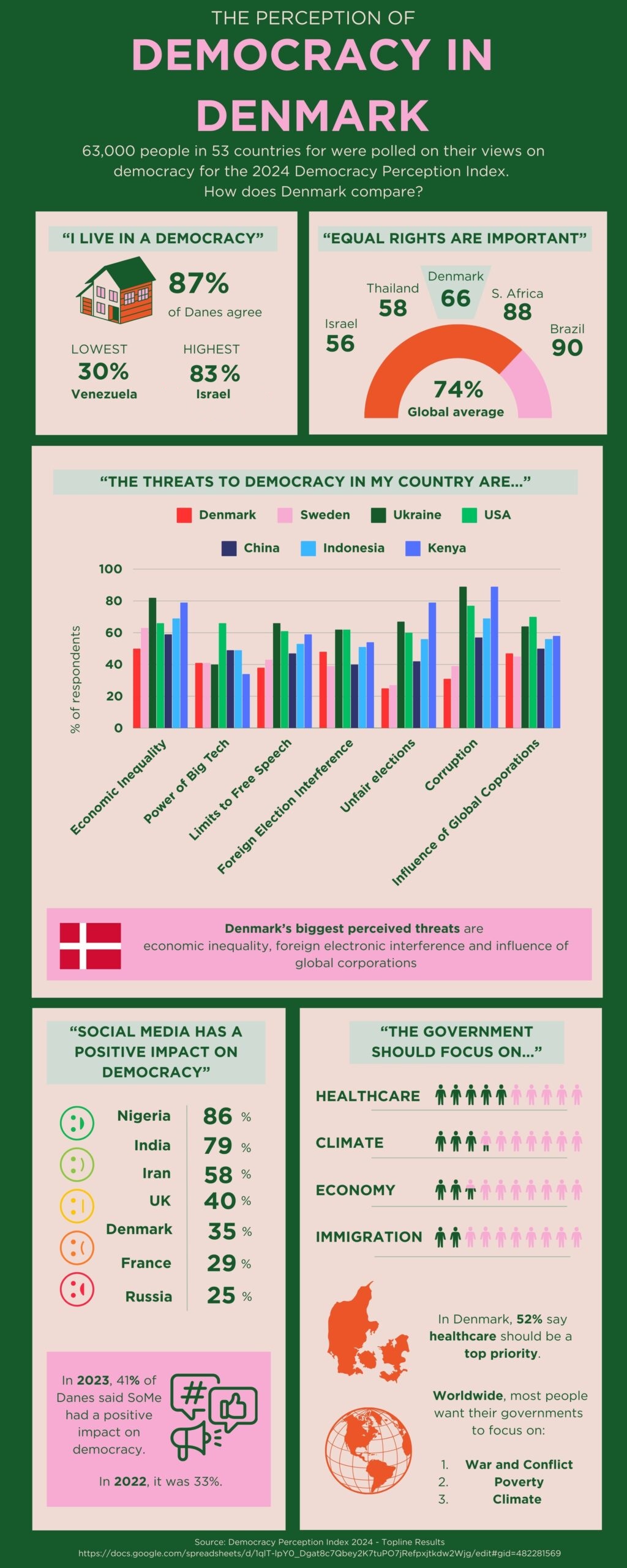People still want to live in a democracy, but fewer believe their own governments are delivering, according to the latest figures from the world’s largest annual study of global perceptions of democracy.
For the 2024 Democracy Perception Index, almost 63,000 people in 53 countries were polled on their views on democracy, their governments’ priorities, global powers like the USA and China, tech platforms, and support for Ukraine and Taiwan.
The Index, produced by the Alliance of Democracies Foundation, found a continuing high perception of democracy in Denmark in contrast to many other nations, a ‘west and the rest’ split in global perspectives on Russia and China, and a wide-ranging level of approval for the EU inside Europe.
Strong faith in democratic values despite government failings
In general, faith in democracy is strong: across the 53 countries surveyed, 85 percent of respondents said that it’s important to have democracy in their country.
But in practice, only 58 percent of the 63,000 respondents are satisfied with the state of democracy. In Hungary, for example, less than one third of the respondents believe they live in a democracy.
Denmark registered a higher-than-average level of 70 percent satisfaction with its democracy, with the biggest perceived threats being “economic inequality”, “foreign electronic interference” and “influence of global corporations”.
Chairman of the Alliance of Democracies Foundation and ex-Prime Minister of Denmark Anders Fogh Rasmussen called the global picture a “wake-up call for all democratic governments”.
“Defending democracy means advancing freedom around the world, but it also means listening to voters’ concerns at home,” he said in a press release.
Europeans focus more on immigration, healthcare – less on climate
Across much of Europe, curbing immigration has risen up the list of voters’ priorities, including in Austria and Germany where it is the number one priority.
Concurrently, the urgency for “fighting climate change” has decreased.
Nowhere is this reversal more striking than in Germany, which now leads the world with the highest proportion of respondents who want the government to focus on reducing immigration at 44 percent, above all other priorities.
Support for the government to prioritise fighting climate change, meanwhile, has fallen to 24 percent – down from 35 percent in 2022.
Despite 33 percent of the world saying that climate change is one of the world’s top three biggest challenges, only 14 percent of people say fighting climate change should be among the top-three priorities for their government.
“Improve healthcare” is the top priority for populations in several western countries, including Denmark, where it garnered a striking 52 percent of the vote. Lowest priority for Danes was “promote gender equality” at 11 percent.
Overall, the figures show that war and violent conflict are perceived as the world’s biggest challenge, followed by poverty and climate change.
In Denmark, climate change takes second place. But another recent survey of democratic priorities amongst Danish 16 to 25-year-olds by Dansk Ungdoms Fællesråd, which is similar in size to the Democracy Index’s Danish data set (around 1200 respondents for both), found that young people are more concerned with climate than the average general populous.
Demokratianalysen 2024 shows that 48 percent of 16 to 25-year-old Danes consider environmental issues the most important political issue, followed by the fight against terrorism and international crime at 26 percent.

Ukraine support holding steady
While there are small signs of Ukraine fatigue, the Democracy Perception Index found support holding relatively steady in most countries.
One third (34 percent) of the global population believes “too little” has been done to assist Ukraine, and roughly half say that the assistance has been the “right amount” (46 percent).
A smaller share of 19 percent feel that “too much” has been done to assist Ukraine.
Approval of EU is wide-ranging
Globally, the perception of the European Union is broadly positive, with a net approval rating of +34 percent, against the US’ +22, China’s +5 and Russia’s -14,
Denmark’s approval rating for the EU is a little above the world average at +39.
Elsewhere in geographical Europe, the figure is mixed, ranging from +8 in France and +13 in Greece, to +57 in Portugal and +61 percent in Ukraine.
The west vs the rest in China and Russia
Support for cutting economic ties with Russia over its invasion of Ukraine remains high in Europe and the United States even after three years of sanctions.
In Denmark, an especially high 63 percent want to sever Russian relations, outstripped only by Ukraine’s 73 percent and Poland’s 63 percent.
Elsewhere however, most people prefer to maintain ties, with the Middle East and North Africa most strongly in favour.
On cutting economic ties with China if it were to invade Taiwan, the world is also split roughly by a West and the rest divide, with people in western democracies generally in favour.
This includes several of China’s largest trading partners: the United States, Japan and Germany. Most other countries, however, would prefer to keep ties – with the Middle East and North Africa again most in favour.
Fogh, who previously held the role of Secretary General of NATO from 2009 to 2014, cautioned that “we risk losing the Global South to the autocracies”.
“We are witnessing an axis of autocracies forming from China to Russia to Iran. We must act now to make freedom more attractive than dictatorship and unite through an alliance of democracies to push back against the emboldened autocrats.”















